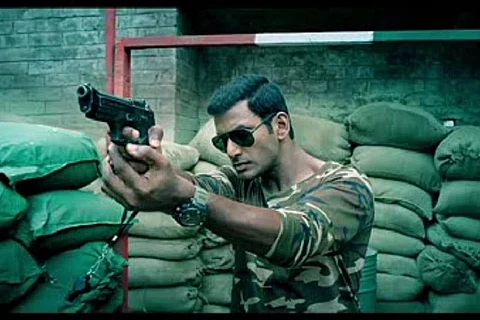

PS Mithran’s Irumbuthirai, starring Vishal, Arjun, Samantha, Delhi Ganesh and others, is doing well at the box office. In what seems to be a trend that’s gaining popularity in Kollywood, the film takes on the central government, this time questioning the security of Aadhaar data.
Irumbuthirai raises some valid questions on data breaches, even if the film may stumble at times with the need to pump up the hero and age-old justifications for giving in to dowry demands. It also slams the central government’s much publicised ‘Digital India’ and takes potshots at demonetisation, ‘cashless’ economy and GST. And, of course, the fact that people like Vijay Mallya have been let off the hook while ordinary folks are harassed by loan sharks finds its place.
Interestingly, PS Mithran put together the project in August 2016 and the film was ready for release in early 2018, just around the time when the Cambridge Analytica scandal broke out in March. However, it had to be postponed because of the Tamil film industry strike.
While watching Irumbuthirai, however, one cannot help but notice how uncannily timely the film is. Towards the end, we’re told that in the future even our votes will be controlled by those who have our data. Given the scepticism around electronic voting machines, platforms like Facebook manipulating the political preferences of users, and concerns about misuse of Aadhaar data, the team has been quite brave in handling such a subject.
Vijay’s Deepavali release Mersal last year famously got into a tussle with the BJP for certain dialogues and scenes that made fun of demonetisation and the GST. While some of the lines presented as facts in the film were straight out of WhatsApp university, the fact that a mainstream film with a big star was speaking about it showed that Kollywood wasn’t going to pander to the Centre in the same way as mainstream Bollywood films have.
Take the difference in treatment between Joker and Toilet: Ek Prem Katha, for instance. Both are films about a couple whose relationship depends on whether or not a toilet is built in the house. While the Tamil film was a tragedy that exposed the hollowness of government schemes, the Akshay Kumar starrer was in unapologetic support of the current central government and laid the blame on the people (and earlier governments) for the practice of open defecation.
Akshay Kumar has been beating the nationalism drum for a while now (and winning a National Award while at it), whether in Airlift or Padman, and there are even reports doing the rounds that he’s all set to star in a film about the RSS.
Irumbuthirai, on the other hand, has a hero who is surprisingly “anti-national”. He’s an army major whose only aim is to get out of India – a sharp contrast to the patriotic ‘jawan at the border’ the public is always asked to think about whenever they object to a government policy. Although Vishal’s Kathiravan does become more responsible and socially conscious as the film progresses, there’s no overcompensation with unnecessary lines on nationalism.
It’s not that Tamil films have never indulged in whipping up nationalism. In fact, Irumbuthirai’s villain, Arjun Sarja, has played such roles in many films in his career. The ‘Action King’, as he’s known, has starred in several films where the plot revolves around fighting terrorists or taking on social evils for the benefit of the country – Gentleman, Jai Hind, Kurudhipunal, Mudhalvan, Thaayin Manikodi, and more recently Nibunan, in which he appeared as a police officer with a national flag tattoo. Actor turned politician Vijayakanth, too, has played such roles in several films.
Nationalism is still a popular theme in Tamil cinema as it was in the days of MGR and Sivaji Ganesan. Mani Ratnam’s Kaatru Veliyidai, for example, included a cringeworthy scene when the Pakistani flag falls down just to get a few whistles from the audience. In that sense, the nationalism that's showcased in Hindi films like Dangal is considered appealing here, too. However, the success of Irumbuthirai shows that a film that questions authority and real life government policies are welcomed by the audience in Tamil Nadu. That is, nationalism/patriotism is not equated to supporting the central govenment's policies or stances unlike the trend in mainstream Bollywood.
This isn’t a sudden change. Soon after the jallikattu protests in January 2017, Tamil popular culture was full of references to the sport. The protests were widely believed to have been triggered by the cultural imposition of the Centre in Tamil Nadu. From filmmakers announcing projects about jallikattu to songs dedicated to the sport, Kollywood stood with the public mood. Several prominent members from the industry also spoke up in support of the sport, including stars like Kamal Haasan and Vijay.
The teaser for Pa Ranjith’s upcoming film Kaala, with Rajinikanth in the lead role, hints that the film will have political references to schemes like Swachch Bharath. While the antagonist, played by Nana Patekar, says that he wants to make everything ‘clean’, Kaala (Rajinikanth) extols the virtues of black, equating it with the sweat and labour of his people.
Tamil Nadu’s people have many a bone to pick with the Centre, whether it is jallikattu, the NEET exam, the Cauvery Management Board or the attempts to ‘Hindify’ the south. The Tamil film industry, which has birthed several leaders in the state (including the latest entrants Rajinikanth and Kamal Haasan), has always had a close relationship with politics. With the public mood ostensibly against the Centre, one can expect many more Tamil films to indulge in a jallikattu with its policies.